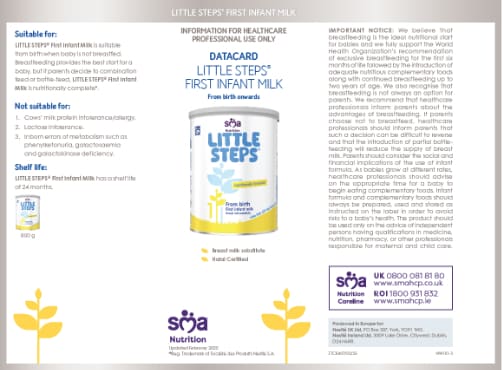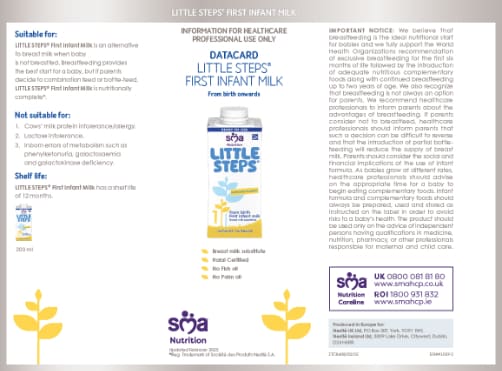SCIENCE INSPIRED BY NATURE
LITTLE STEPS® First Infant Milk
A nutritionally complete formula milk suitable from birth, it can be used for those infants who are not being breastfed or those who are being combination fed.
Product description
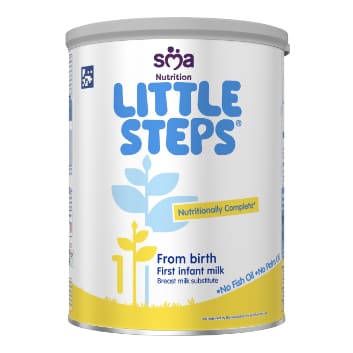

Nutritionally complete
LITTLE STEPS® is designed to provide baby with a balanced nutritional foundation.
Halal Certified
Good To Know
In the UK:
Babies that have 500 ml or more (about a pint) of LITTLE STEPS® First Infant Milk a day will not need vitamin D supplements.1
In Ireland:
The Food Safety Authority of Ireland (FSAI) recommends that formula fed babies will benefit from the use of a supplement that only provides vitamin D.2
Data card
Formats
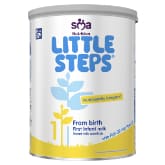
800 g Powder
The scoop is provided under the lid. It can be stored in suspension inside the can.
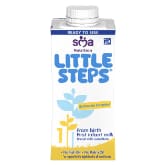
Liquid Milk (200 ml carton)
Ready to Use resealable carton, which is easy to pour and can be kept in the fridge (5˚C or below) for up to 24 hours.
Preparation
Information for you to give to parents
How to open and prepare your baby's feed – powder (800 g)
While this product is made under strict hygienic conditions, it is not sterile. Failure to follow instructions on preparation and storage may make your baby ill.

Pull the safety seal and open the lid. The scoop is provided under the lid. Lift the tab, pull on the foil seal, carefully and safely remove the seal and dispose of it.

Wash hands well. Wash and sterilise all utensils according to manufacturers’ instructions.

Boil 1 litre of fresh tap water. Allow boiled water to cool for no more than 30 minutes. Measure the required amount of water (see feeding guide) into a sterilised bottle, carefully – the water is hot. Do not use artificially softened or repeatedly boiled water.

Using only the scoop provided, add the correct number of scoops of powder (see feeding guide), levelling off each scoop with the back of a clean, dry knife. Store the scoop in suspension inside the can and replace lid.

Place the sterilised teat and cap on the bottle and shake well until powder is fully dissolved. Cool bottle under cold running water or in a bowl or jug of cold water until lukewarm, do not immerse the teat. Test temperature by shaking a few drops onto the inside of your wrist.
Useful helpsheets for you to share with parents:
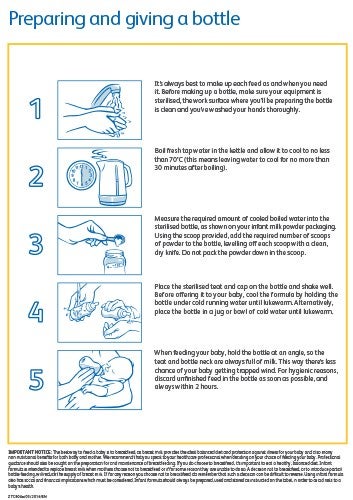
Preparing and giving a bottle
This downloadable helpsheet is available in multiple languages.
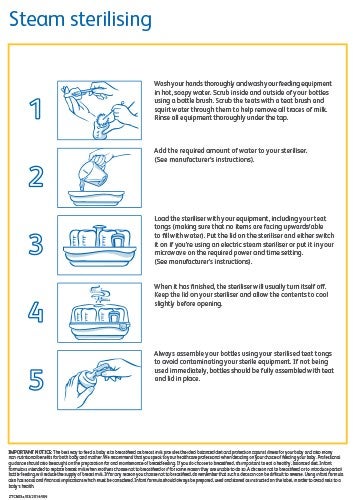
Feeding guide
Information for you to give to parents
Feeding guide – powdered milk
|
Feeding guide birth – 12 months |
||||||
|
Approx. age of baby |
Approx. weight of baby |
Preparation for single feeds |
Feeds in 24 hours |
|||
|
Cooled, freshly boiled water |
||||||
|
kg |
lb |
Level scoops |
ml |
fl. oz. (approx.) |
||
|
Birth – 2 weeks |
3.4 |
7½ |
3 |
90 |
3 |
6 |
|
2 – 4 weeks |
3.7 |
8 |
4 |
120 |
4 |
6 |
|
4 – 8 weeks |
4.2 |
9¼ |
4 |
120 |
4 |
6 |
|
2 months |
5.3 |
11¾ |
5 |
150 |
5 |
5 |
|
3 months |
6.1 |
13½ |
6 |
180 |
6 |
5 |
|
4 months |
6.7 |
14¾ |
6 |
180 |
6 |
5 |
|
6 months |
7.6 |
16¾ |
8 |
240 |
8 |
4 |
|
7 – 12 months |
- |
- |
7 |
210 |
7 |
3 |
This table is a guide only; a baby may need more or less than the volumes stated. Caregivers should consult their healthcare professional if more advice is needed. Remember, a baby should be fed on demand.
Mix 1 scoop of powder to 30 ml (approx. 1 fl. oz.) of water. Approx. 177 scoops per can (applicable to 800 g can only). 1 scoop = 4.5 g.
Important feeding information
Information for you to give to parents
LITTLE STEPS® First Infant Milk powder – 800 g
|
|
Do not add extra powder or water to make the feeds stronger or weaker and do not press powder into scoop. Using too much or too little powder can make your baby ill. |
|
|
We recommend preparing each feed in individual beaker/bottles when required. |
|
|
For hygienic reasons, discard unfinished feed in the beaker/bottle as soon as possible. |
|
|
Made-up formulae can be poured over cereals and mixed with food. |
|
|
Do not alter or add to formulae unless medically directed. |
|
|
Do not warm feeds in a microwave, hot spots may occur and cause scalding. |
|
|
Remember, cows' milk should not be used as a drink during the first year. |
-
NHS (2017). Vitamin D. Available at https://www.nhs.uk/conditions/vitamins-and-minerals/vitamin-d/ (accessed April 2019).
-
Food Safety Authority of Ireland (FSAI), (2007). Recommendations for a National Policy on Vitamin D Supplementation for Infants in Ireland. Food Safety Authority of Ireland, Abbey Court, Lower Abbey Street, Dublin 1.
-
NHS (2016). Types of formula milk. Available at https://www.nhs.uk/conditions/pregnancy-and-baby/types-of-infant-formul… (accessed March 2019).
*Contains DHA (as required by the legislation for all infant formula)
DHA, docosahexaenoic acid.
LCP, long-chain polyunsaturate.
IMPORTANT NOTICE:
The World Health Organisation (WHO) has recommended that pregnant women and new mothers be informed on the benefits and superiority of breastfeeding – in particular the fact that it provides the best nutrition and protection from illness for babies. Mothers should be given guidance on the preparation for, and maintenance of, lactation, with special emphasis on the importance of a well-balanced diet both during pregnancy and after delivery. Unnecessary introduction of partial bottle-feeding or other foods and drinks should be discouraged since it will have a negative effect on breastfeeding. Similarly, mothers should be warned of the difficulty of reversing a decision not to breastfeed. Before advising a mother to use an infant formula, she should be advised of the social and financial implications of her decision: for example, if a baby is exclusively bottle-fed, more than one can (400 g) per week will be needed, so the family circumstances and costs should be kept in mind. Mothers should be reminded that breast milk is not only the best, but also the most economical food for babies. If a decision to use an infant formula is taken, it is important to give instructions on correct preparation methods, emphasising that unboiled water, unsterilised bottles or incorrect dilution can all lead to illness.


